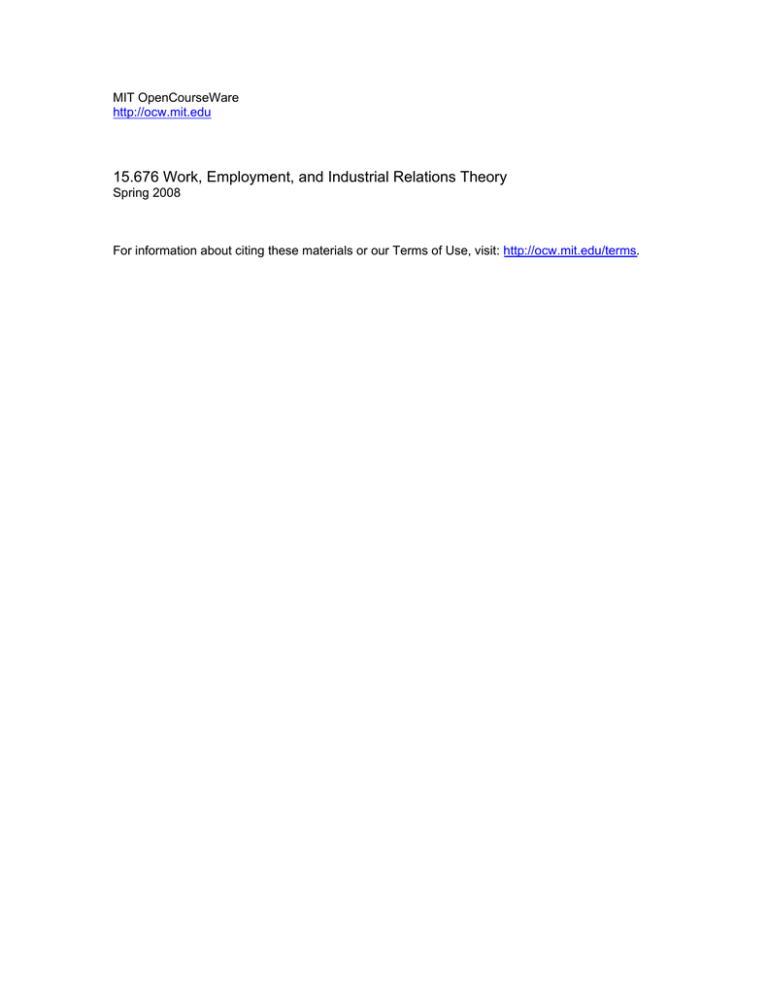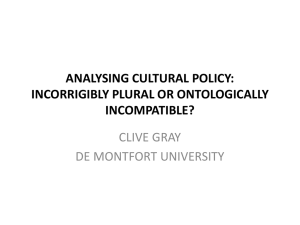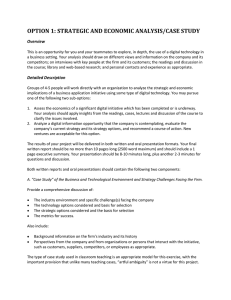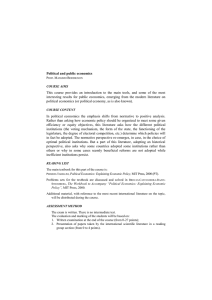15.676 Work, Employment, and Industrial Relations Theory
advertisement

MIT OpenCourseWare http://ocw.mit.edu 15.676 Work, Employment, and Industrial Relations Theory Spring 2008 For information about citing these materials or our Terms of Use, visit: http://ocw.mit.edu/terms. Work, Employment, and IR Theory & Research Session 1 Goals for the overall Term 1. Trace development and current challenges/issues in W, E, & IR as a field of study 2. Understand role of IR in the social sciences that study work & employment relations 3. Develop your personal normative and theoretical framework for studying these issues. 4. Deepen and apply our understanding of theory, research design and moving from broad ideas to concrete research outputs. Goals for Today and Next Week’s Session 1. Get to know each other and our respective interests 2. Discuss where W.E, & IR fit in the social sciences—historically, currently, future 3. Position Study of Work & Employment in context of the history of IR as a field 4. Assess where we are circa 2008—key challenges facing IR theory & research today. Then, next week: 1. Trace evolution of the field in the context of the changing social/econ/pol envs. 2. Discuss what’s distinctive about IR Theory The Endless Debates about the Field: Debates over definition & scope: In 1980, I began a book on Collective Bargaining and Industrial Relations with this paragraph: “In the broadest sense, industrial relation is an interdisciplinary field that encompasses the study of all aspects of people at work. The field includes the study of individuals, groups, of workers who may or may not organize into a union or an association, the behavior of employer and union organizations, the public policy or legal framework governing e3mployment conditions, the economics of employment problems, and even the comparative analysis of industrial relations systems in different countries over different time periods. Industrial relations researchers draw on the relevant aspects of the established disciplines of law, economics, history, and the behavioral sciences to describe, predict, and sometimes prescribe solutions to problems in the field. Yet because of the interdisciplinary nature of their approach, industrial relations researchers are not bound by the limits or traditional boundaries of these separate disciplines. Since almost all employment problems involve dimensions that cut across the traditional disciplines, adequate analysis and/or treatment of problems must also reflect their full range and complexity.” So, we have always claimed to be a broad based field of inquiry….. But, in practice, too many of us did focus on union-management relations. So my first question for discussion: Is union decline the total explanation for what many lament has been the declining influence of industrial relations? What else was happening in the social sciences in recent years? To understand this let’s take a bit longer term view of the positioning of IR in the social sciences: Early years: IR grows out of the revolt of institutional economists from the classical and then neo classical grip of the economics discipline. Early debates in economics: how to study labor as more than a commodity Early debates with other disciplines: Industrial engineering: Scientific Management—one best way? Social Psychology: Human relations as the cure for the labor problem? 1940s: Lester/Malchup debate: Marginal economic analysis versus institutional theories of wage setting 1940s: IRRA founded to bring multiple disciplines together; IR Centers in universities set up to do the same thing. 1950s-60s: Resurgence of neo-classical labor economics: Human capital theory and then the Ashenfelter revolution in quantitative labor economics 1970s: Efforts to bring behavioral science into IR—shift in training of PhD students to deepen theory and methodological skills 1970s-present—rebirth of disciplines: Labor History: From Labor Union History to the “New Labor History”—Herbert Gutman’s 1977 book, Work, Culture & Society in Industrializing America Political Science circa 1990s—Rebirth of Comparative Politics—Thelen & Locke “Apples and Oranges” paper Economics: Renewed appreciation for institutions—with quantitative tools— Freeman & Medoff’s 1984 book What do Unions Do? Sociology: Emergence of Economic Sociology—Granovetter’s 74 article on weak ties in the labor market So where are we today and what is the best strategy for moving forward? Will the intensity and scope of the problems facing workers, the economy, and labor market institutions—unions and others—produce another shift toward interdisciplinary work to solve real work and employment problems? Carving out your own identity: How can you position your work to advance the field of IR/W&E and contribute to one or more disciplines without becoming just another among many working on these issues within sociology, economics,….etc?



